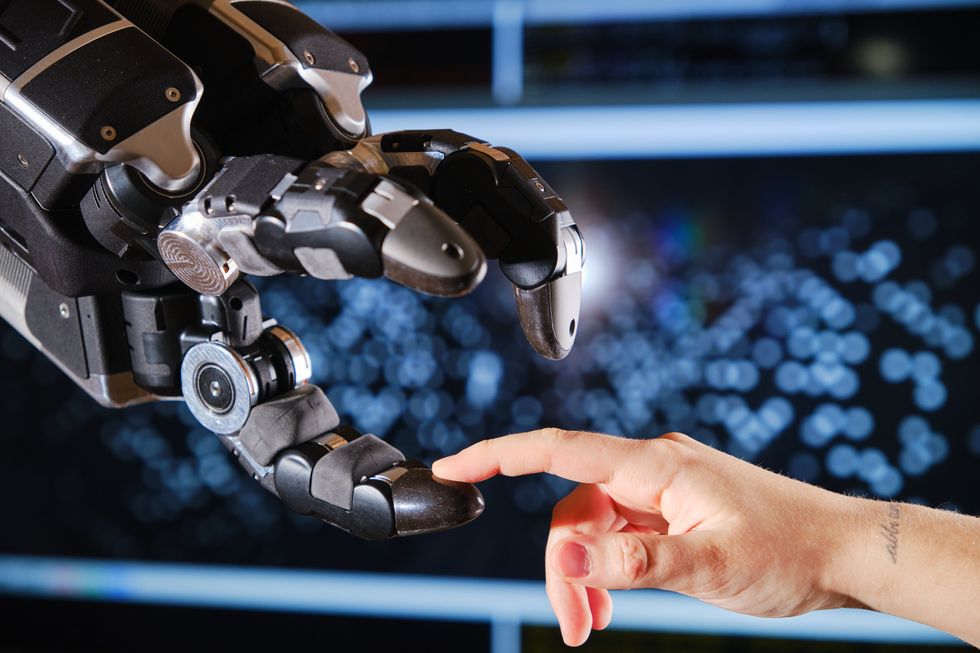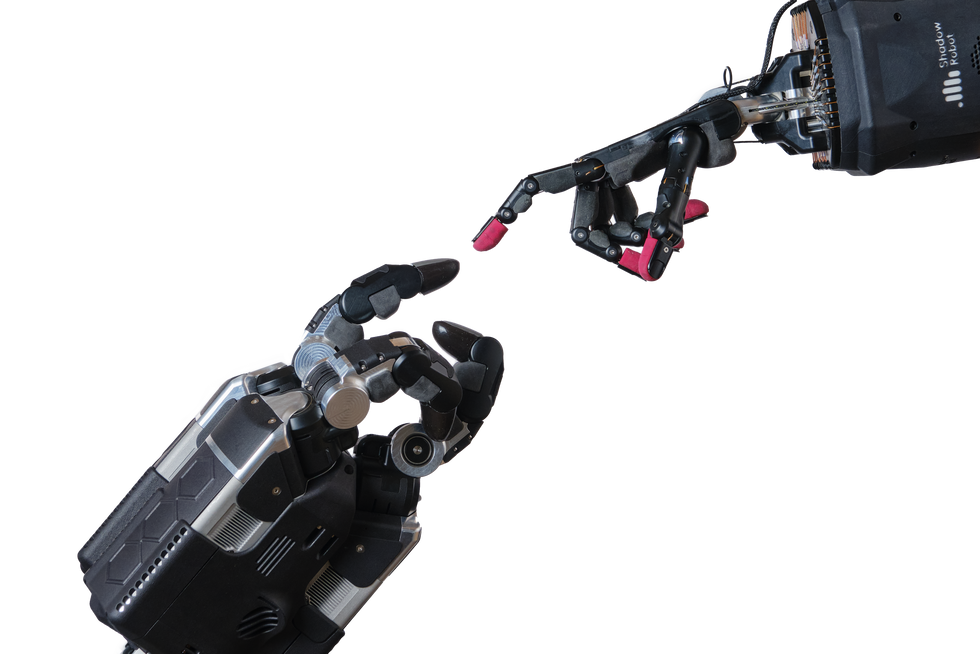For years, Shadow Robot Company’s Shadow Hand has arguably been the gold standard for robotic manipulation. Beautiful and expensive, it is able to mimic the form factor and functionality of human hands, which has made it ideal for complex tasks. I’ve personally experienced how amazing it is to use Shadow Hands in a teleoperation context, and it’s hard to imagine anything better.
The problem with the original Shadow hand was (and still is) fragility. In a research environment, this has been fine, except that research is changing: Roboticists no longer carefully program manipulation tasks by, uh, hand. Now it’s all about machine learning, in which you need robotic hands to massively fail over and over again until they build up enough data to understand how to succeed.
“We’ve aimed for robustness and performance over anthropomorphism and human size and shape.” —Rich Walker, Shadow Robot Company
Doing this with a Shadow Hand was just not realistic, which Google DeepMind understood five years ago when it asked Shadow Robot to build it a new hand with hardware that could handle the kind of training environments that now typify manipulation research. So Shadow Robot spent the last half-decade-ish working on a new, three-fingered Shadow Hand, which the company unveiled today. The company is calling it, appropriately enough, “the new Shadow Hand.”
As you can see, this thing is an absolute beast. Shadow Robot says that the new hand is “robust against a significant amount of misuse, including aggressive force demands, abrasion and impacts.” Part of the point, though, is that what robot-hand designers might call “misuse,” robot-manipulation researchers might very well call “progress,” and the hand is designed to stand up to manipulation research that pushes the envelope of what robotic hardware and software are physically capable of.
Shadow Robot understands that despite its best engineering efforts, this new hand will still occasionally break (because it’s a robot and that’s what robots do), so the company designed it to be modular and easy to repair. Each finger is its own self-contained unit that can be easily swapped out, with five Maxon motors in the base of the finger driving the four finger joints through cables in a design that eliminates backlash. The cables themselves will need replacement from time to time, but it’s much easier to do this on the new Shadow Hand than it was on the original. Shadow Robot says that you can swap out an entire New Hand’s worth of cables in the same time it would take you to replace a single cable on the old hand.

The new Shadow Hand itself is somewhat larger than a typical human hand, and heavier too: Each modular finger unit weighs 1.2 kilograms, and the entire three-fingered hand is just over 4 kg. The fingers have humanlike kinematics, and each joint can move up to 180 degrees per second with the capability of exerting at least 8 newtons of force at each fingertip. Both force control and position control are available, and the entire hand runs Robot Operating System, the Open Source Robotics Foundation’s collection of open-source software libraries and tools.
One of the coolest new features of this hand is the tactile sensing. Shadow Robot has decided to take the optical route with fingertip sensors, GelSight-style. Each fingertip is covered in soft, squishy gel with thousands of embedded particles. Cameras in the fingers behind the gel track each of those particles, and when the fingertip touches something, the particles move. Based on that movement, the fingertips can very accurately detect the magnitude and direction of even very small forces. And there are even more sensors on the insides of the fingers too, with embedded Hall effect sensors to help provide feedback during grasping and manipulation tasks.

The most striking difference here is how completely different of a robotic-manipulation philosophy this new hand represents for Shadow Robot. “We’ve aimed for robustness and performance over anthropomorphism and human size and shape,” says Rich Walker, director of Shadow Robot Company. “There’s a very definite design choice there to get something that really behaves much more like an optimized manipulator rather than a humanlike hand.”
Walker explains that Shadow Robot sees two different approaches to manipulation within the robotics community right now: There’s imitation learning, where a human does a task and then a robot tries to do the task the same way, and then there’s reinforcement learning, where a robot tries to figure out how do the task by itself. “Obviously, this hand was built from the ground up to make reinforcement learning easy.”
The hand was also built from the ground up to be rugged and repairable, which had a significant effect on the form factor. To make the fingers modular, they have to be chunky, and trying to cram five of them onto one hand was just not practical. But because of this modularity, Shadow Robot could make you a five-fingered hand if you really wanted one. Or a two-fingered hand. Or (and this is the company’s suggestion, not mine) “a giant spider.” Really, though, it’s probably not useful to get stuck on the form factor. Instead, focus more on what the hand can do. In fact, Shadow Robot tells me that the best way to think about the hand in the context of agility is as having three thumbs, not three fingers, but Walker says that “if we describe it as that, people get confused.”
There’s still definitely a place for the original anthropomorphic Shadow Hand, and Shadow Robot has no plans to discontinue it. “It’s clear that for some people anthropomorphism is a deal breaker, they have to have it,” Walker says. “But for a lot of people, the idea that they could have something which is really robust and dexterous and can gather lots of data, that’s exciting enough to be worth saying okay, what can we do with this? We’re very interested to find out what happens.”
The Shadow New Hand is available now, starting at about US $74,000 depending on configuration.
>>> Read full article>>>
Copyright for syndicated content belongs to the linked Source : IEEE – https://spectrum.ieee.org/robot-hand-shadow-robot-company










